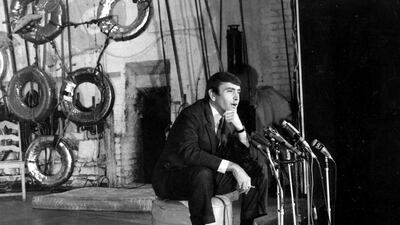"You make me puke". This is not even the most scathing put-down Martha issues to her husband, George, in playwright Edward Albee's coruscating study of marital discord, Who's Afraid Of Virginia Woolf?.
“I am the Earth Mother, and you are all flops” and “I swear, if you existed, I’d divorce you,” are two other memorable moans so cutting that there’s a dark humour (and certainly an intellectual battle) in the couple’s jousting.
But just when it seems Who's Afraid Of Virginia Woolf? might be wallowing rather voyeuristically in the ruins of a marriage, Martha shrieks: "We cry, and we take our tears, and we put 'em in the ice box, in the goddamn ice trays until they're all frozen and then … we put them in our drinks."
As a heartbreaking portrait of a destructive relationship doomed to repeat the same mistakes over and over, it is perfect.
And as the theatre world mourns the loss of brilliant American playwright Albee, who died on Friday, it is likely to go down as a key line in a standout 20th-century work.
I last saw this era- and genre- defining play, which Albee wrote in 1962, in 2007 at the Royal Exchange Theatre in Manchester, England. Martha was played by enduring British stage and television actress Barbara Marten. More famously, Elizabeth Taylor won an Oscar for her depiction in Mike Nichols’ 1966 film, while Kathleen Turner was nominated for a Tony Award for her Broadway performance in 2005.
But for all the brilliant actresses who have taken on the role, the strident, vulgar Martha inhabits them rather than the other way round. Albee’s truly amazing feat is to make what could be a gruelling, even unpleasant, experience visceral and rather surreal. Enjoyable, even.
Who's Afraid Of Virginia Woolf? is, of course, his key work – but may not even be his best.
A Delicate Balance, his 1966 play in which frightened neighbours Harry and Edna demand sanctuary with their wealthy friends, Agnes and Tobias, won him the Pulitzer Prize. It's another domestic drama packed with razor-sharp lines, but more restrained and poetic.
Once again, there is late-night drinking and a sense of menace – but where Albee makes the audience wait for the twist in Virginia Woolf, this time there is immediate intrigue to the set-up. We never find out exactly why the neighbours feel the need to leave their home, beyond some kind of unspecified dread. It has been read as a treatise on 1960s fears of nuclear armageddon, although these days directors tend to lean towards a more general exploration of middle-class boredom.
Naturally, since Albee’s death there have been plenty of well-deserved notices citing the influence of these plays on not only modern theatre, but storytelling in general.
Up In The Air actress Anna Kendrick perhaps put it best when she said that seeing one of his plays "made me fall in love with theatre ... Albee is a legend, genius, treasure". He has had that effect on generations of actors whose very rites of passage have included getting their teeth into one of his characters.
Who's Afraid Of Virginia Woolf? famously didn't win a Pulitzer because the judges felt that it was too profane and depressing. But it was precisely these elements that made the 1966 film so shocking and groundbreaking.
Modern audiences are used to shows such as Breaking Bad, which explore the unravelling of a marriage. But in 1966, married couples had never been depicted in this way on screen, even if they were, of course, behaving in despicable ways behind closed doors. So Albee's maxim that "a play, at its very best, is an act of aggression against the status quo" has inspired innumerable writers of drama.
Ironically, the “status quo” quote came at a time when Albee himself was finding that being aggressive rather than populist didn’t really fly on Broadway.
The absurdist Seascape (featuring two talking lizards) was rewarded with the Pulitzer in 1975, but The Lady From Dubuque and angry satire The Man Who Had Three Arms flopped – partly because chronicling the collapse of the American dream wasn't really in step with the attitudes of the early 1980s, and partly because Albee was battling with alcoholism.
His return to prominence with Three Tall Women (1991) and The Goat, Or Who Is Sylvia (2002) proved his enduring capability for greatness, both in terms of his commitment to the surreal (The Goat features a man falling in love with the titular animal) and his sharp eye for the span and story of a human life.
But though he didn't always like it – he said the success of Who's Afraid Of Virginia Woolf? "hung about my neck like a shining medal of some sort, really nice but a trifle onerous," – his most famous work has a lesson for us all.
When asked if it had a message, he once said: “Probably. I hope there are a bunch of them. Participate in your own life – fully. Don’t sink back into that which is easy and safe.
“You’re alive only once, as far as we know, and what could be worse than getting to the end of your life and realising you hadn’t lived it?”
Edward Albee certainly lived his.
artslife@thenational.ae

